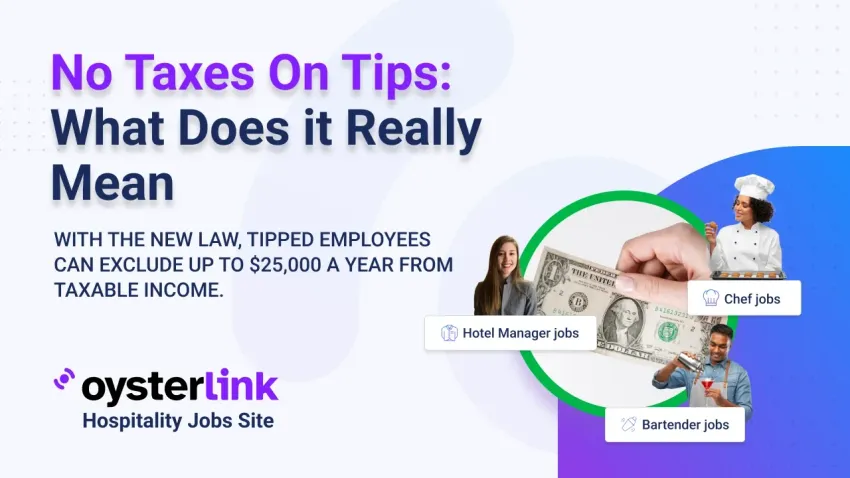No Taxes on Tips: 3 Key Takeaways
- No taxes on tips lets eligible workers exclude up to $25,000 in cash tips from taxable income each year.
- The tax break phases out for individuals earning above $150,000 and couples above $300,000.
- Servers and Bartenders gain the most, while Cooks and Dishwashers see no benefit.
No taxes on tips could put thousands of dollars back into workers’ pockets and forces the restaurant industry to rethink pay.
And while many Servers and Bartenders welcome the change, critics warn it leaves out back-of-house staff and ignores deeper wage problems.
No Tax on Tips: What the Policy Actually Means
No taxes on tips refers to a new federal income tax deduction allowing eligible tipped workers to exclude up to $25,000 in cash tips from taxable income each year, effective for the 2025 through 2028 tax years.
The deduction applies to people earning less than $150,000 (single filers) or $300,000 (married), phasing out at higher incomes.
No Tax on Tips: How It Came to Be
Donald Trump made no tax on tips a campaign centerpiece, inspired by a conversation with a Waitress in Nevada who complained about heavy taxation on her tips.
The proposal gained political traction and bipartisan support during the 2024 campaign.
The Senate unanimously passed the No Tax on Tips Act in May 2025, and it was signed into law on July 4, 2025.
No Tax on Tips: Who Benefits (and Who Doesn’t)
On the plus side, workers in traditionally tipped roles (Servers, Bartenders, etc.) stand to gain extra take-home cash.
However, criticism is widespread: economists and advocates argue the deduction:
- Favors certain workers while excluding back-of-house staff
- Is regressive, as many low-income workers already owe no federal income tax
- May offer minimal benefit when offset by broader cuts to social safety net programs under the same legislation.
No Taxes on Tips: Why It Feels Like a Raise but Isn’t
For many, it feels like a raise, but the impact isn’t the same for everyone.
- Servers in high-volume, big-city restaurants will see the largest gains.
- Workers in diners or rural areas with lower tipping averages may see smaller benefits.
- The gap between front-of-house staff who earn tips and back-of-house staff like cooks or dishwashers, who don’t, could widen.
And while more cash in hand is meaningful, it doesn’t add to retirement accounts or healthcare benefits, and tips remain irregular—making them harder to rely on for long-term financial stability.
No Taxes on Tips: Impact on Recruitment and Retention
Restaurants may gain a competitive edge in hiring by advertising higher take-home pay without raising wages.
Many restaurant workers cite low pay as a reason for leaving the industry, so this tax break could make hospitality jobs more appealing.
No Taxes on Tips: The Upside for Employers
The policy doesn’t directly cut taxes for business owners, but it brings indirect benefits:
- Happier, better-paid workers tend to deliver better service, leading to repeat customers.
- Additional worker earnings may circulate back into local economies, including restaurants themselves.
69% of shift workers report feeling exhausted due to long hours, last-minute changes, and constant performance pressure (source: Planday)
No Taxes on Tips: What It Means for Restaurant Revenue
The law doesn’t change how much revenue restaurants make from food or drink sales.
But it could influence the bottom line through indirect effects:
- Improved service can mean higher average checks and larger tips.
- Better pay may create a positive cycle—satisfied workers serving satisfied guests.
Source: U.S. Department of Labor
No Taxes on Tips: Reform or Band-Aid?
Supporters call this a quick win for workers who want to keep more of their hard-earned money.
Critics argue it’s a Band-Aid solution that doesn’t address systemic wage issues, like the sub-minimum wage for tipped workers.
No Taxes on Tips: Final Thoughts
No taxes on tips represents one of the most significant changes in service industry pay in decades.
For workers, it’s more money in their pockets. For employers, it’s a retention tool. And for the industry, it may spark a broader conversation about fair pay and long-term sustainability.
The real test will be how this policy plays out in practice—whether it delivers lasting benefits or simply masks deeper wage challenges.
About OysterLink
OysterLink is the leading job platform for restaurant and hospitality professionals, connecting talent with top opportunities nationwide.
With 400,000+ monthly visitors, the platform features jobs at premier restaurants and hotels while also providing trend reports, career advice, and industry leader interviews.
For media inquiries, please contact our team at [email protected]









Loading comments...